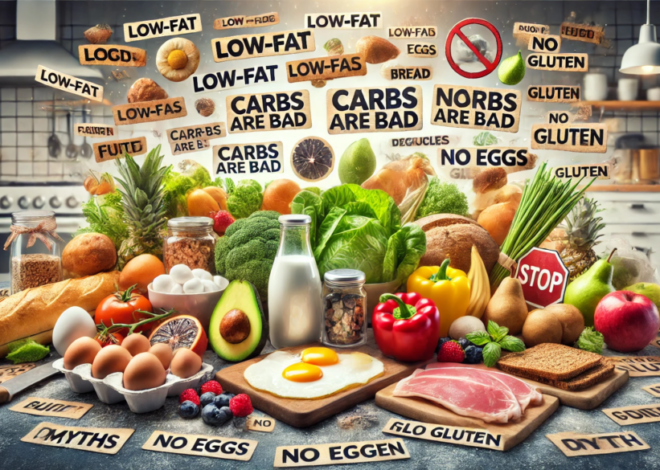
The Myth of the Perfect Diet: Why One Size Doesn’t Fit All
The perfect diet myth suggests that one universal eating plan fits everyone, yet research shows that’s not realistic. With over 3,000 diets globally and varied genetic makeups, finding one perfect diet is improbable. Personalized nutrition considers genetic, cultural, and lifestyle differences, offering more benefits. This post explores why no single diet works universally and emphasizes understanding individual needs. Dive in to learn the limitations of standardized diets and how individuality impacts nutritional success.
Understanding the Concept of a Perfect Diet
The idea of a perfect diet has intrigued humanity for centuries. Yet, what constitutes a perfect diet remains elusive. Various factors contribute to this complexity, and understanding them is key to achieving optimal health. Let’s explore the origins of diet trends, why many believe in one-size-fits-all diets, and the science supporting individualized dietary needs.
Origins and Evolution of Diet Trends
Diet trends have always reflected society’s changing beliefs and values. Ancient cultures relied heavily on available resources, leading to diets rich in local produce and meats. With globalization, the spread of dietary ideas flourished.
- Ancient Diets: Cultures like the Greeks and Egyptians followed diets influenced by agriculture and trade.
- Renaissance and Enlightenment: The focus shifted to moderation and the balance of flavors.
- 20th Century Boom: Industrialization and media led to fad diets like Atkins and low-fat regimes.
These diets often promised quick fixes, playing on society’s desire for instant gratification. As nutritional science advanced, so did the understanding of dietary needs, leading to more scientific approaches to eating.
Why People Believe in One-Size-Fits-All Diets
The allure of one-size-fits-all diets is rooted in simplicity. Mass appeal diets often promise universal results, making them attractive to those seeking quick solutions. Here’s why they continue to captivate:
- Marketing Influence: Effective campaigns often portray these diets as revolutionary, convincing many to follow.
- Success Stories: Personal testimonials can seem relatable, driving interest.
- Community Support: Group participation fosters a sense of belonging, encouraging adherence.
However, these diets often overlook individual differences, which are crucial for effective nutrition. The complexity of the human body demands more nuanced dietary strategies.
The Science Behind Individual Dietary Needs
The notion of personalized nutrition is gaining recognition. Science supports that no single diet suits everyone, as individuality in dietary needs is essential. Here’s why:
- Metabolic Differences: Each person metabolizes nutrients differently, affecting energy levels and weight management.
- Gut Microbiome: Unique gut bacteria compositions influence how food is digested and absorbed.
- Genetic Factors: Genetic predispositions can dictate specific dietary requirements.
These scientific insights underscore the importance of tailoring diets to individual needs, ensuring optimal health outcomes.
Factors That Influence Individual Dietary Needs
Understanding individual dietary needs requires examining a range of influences. From genetic makeup to cultural norms, these factors shape what and how we eat. Let’s delve into the critical factors affecting dietary choices and needs.
Genetic Variations in Nutrient Metabolism
Genetics play a pivotal role in how we process nutrients. Each individual’s genetic makeup influences their metabolism, impacting dietary effectiveness.
- Enzyme Function: Variations in enzyme activity can affect nutrient absorption and metabolism.
- Lactose Intolerance: Common genetic variations can cause lactose intolerance, requiring dietary adjustments.
- Caffeine Sensitivity: Some people metabolize caffeine differently, affecting consumption recommendations.
Understanding genetic predispositions helps tailor dietary plans, making them more effective and personalized.
Cultural and Lifestyle Influences on Eating Habits
Cultural background and lifestyle significantly shape dietary preferences and habits. These influences determine the foods we choose and how we consume them.
- Cultural Traditions: Cultural practices often dictate meal structures and food choices.
- Social Settings: Dining with family or community can influence portion sizes and food selection.
- Lifestyle Factors: Busy schedules might lead to convenience-based eating, affecting nutritional quality.
Acknowledging these influences is essential for creating sustainable and personalized nutrition plans that honor individual lifestyles.
Age, Gender, and Health Conditions Affecting Diet Choices
Demographic factors also play a crucial role in dietary needs. Age, gender, and health conditions significantly impact nutritional requirements.
- Age-related Needs: Nutrient needs vary across different life stages, requiring tailored nutrition.
- Gender Differences: Men and women have distinct nutritional requirements due to physiological differences.
- Health Conditions: Chronic illnesses or allergies necessitate specific dietary modifications.
Identifying these factors helps in developing effective dietary plans that cater to individual health needs and preferences.
Finding Your Personalized Nutrition Plan
Creating a personalized nutrition plan involves understanding unique dietary needs and preferences. It’s a journey of assessment, professional guidance, and adjustment. Let’s explore how to find a nutrition plan tailored to your needs.
Assessing Nutritional Needs and Goals
Understanding your body’s specific needs and setting clear goals is the first step in personalizing a diet. This involves:
- Identifying Nutrient Deficiencies: Blood tests can help detect deficiencies or imbalances.
- Setting Health Goals: Whether it’s weight loss, muscle gain, or overall well-being, goals guide dietary choices.
- Tracking Progress: Regular monitoring helps in adjusting the diet for better results.
This assessment phase ensures that dietary plans align with personal health objectives and nutritional needs.
The Role of Professional Guidance in Diet Planning
Professional guidance can be invaluable in crafting effective nutrition plans. Dietitians and nutritionists offer expertise and personalized strategies.
- Tailored Advice: Professionals provide recommendations based on individual health profiles.
- Support and Accountability: Regular consultations help maintain motivation and adherence.
- Evidence-based Practices: Utilizing the latest research ensures science-backed dietary advice.
Working with a professional can enhance the effectiveness of dietary plans, providing support and personalized insights.
Trial and Error: Adapting and Modifying Your Diet
Finding the perfect diet often involves experimentation. Through trial and error, adjustments can be made to accommodate changing needs and preferences.
- Testing New Foods: Introducing new foods helps discover what works best for your body.
- Monitoring Reactions: Observing how your body responds to changes can guide adjustments.
- Staying Flexible: Being open to modifying your diet ensures it remains effective and enjoyable.
This flexible approach allows for a dynamic relationship with food, supporting long-term health and wellness.
Conclusion
Many believe there is one perfect diet for everyone, but this is a myth. Individual health needs, genetics, and lifestyles greatly influence what is an ideal diet for a person. Nutritional science shows that a variety of dietary patterns can support health. The oversimplification of diet advice often overlooks these individual differences. It’s important to focus on balanced, diverse eating habits tailored to personal health goals and conditions.
FAQ
What are common misconceptions about the perfect diet?
Many people believe that a single diet plan works for everyone, which isn’t true. Another misconception is that rigid diets with extreme restrictions lead to long-term health benefits. Often, such diets are not sustainable and can cause nutritional imbalances.
How does the perfect diet myth affect eating habits?
The myth can create unhealthy relationships with food, leading to yo-yo dieting. People might feel guilty or frustrated when they can’t stick to an unrealistic plan, which can damage self-esteem and lead to unhealthy eating patterns.
Why is there no one-size-fits-all diet plan?
Each person has unique nutritional needs based on genetics, lifestyle, health goals, and personal preferences. What works for one individual may not work for another due to these differences, making personalized plans more effective.
How can you identify if a diet is not suitable for you?
If a diet causes fatigue, mood swings, or constant hunger, it may not be the right fit. It’s essential to listen to your body. Significant weight changes or digestive issues can also be indicators that a diet isn’t suitable.
What role does personalized nutrition play in debunking the perfect diet myth?
Personalized nutrition considers individual differences, offering a tailored approach that aligns with specific health needs and goals. This strategy helps dismantle the myth by showing that personalized plans are more effective and sustainable.
How can you develop a sustainable eating plan that works for you?
Start by setting realistic goals and incorporating a variety of foods. Focus on balance and moderation. Consulting a nutritionist can provide valuable insights, helping you create a plan that accommodates your lifestyle and dietary needs.











